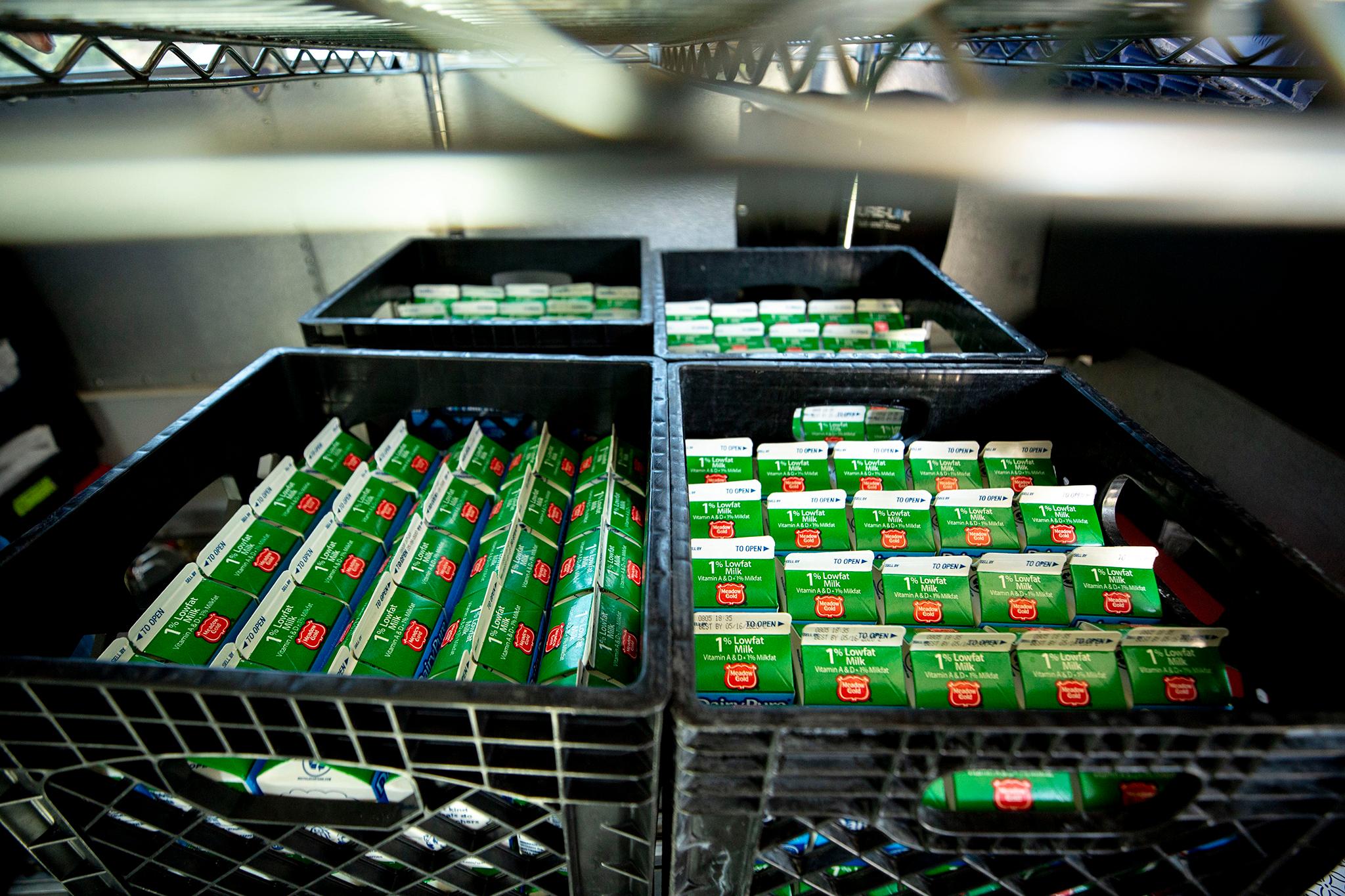A bandanna bearing the slogan "I love Jesus" with a heart instead of the word "love" served as a face mask for Ellen Konadu when she arrived on a Saturday morning at a Food Bank of the Rockies distribution center in Montbello.
Konadu, a home care aide, said her clients had become concerned she might bring the coronavirus into their homes. After a month without work, she was collecting cans of vegetables and stew, fresh fruit, milk and butter and frozen meat for her family of five.
"Everything has changed," Konadu said.
The coronavirus has led to longer lines for aid in a city where, according to Denver food systems administrator Laine Cidlowski, applications for SNAP nearly doubled following the disease outbreak. The pandemic also has disrupted the network that redistributes a wealth of food that would otherwise be wasted.
"What we're seeing now is really unprecedented," said Jason Harrison, Colorado food pantry manager for Hunger Free Colorado. "There's just so many layers to this, that it's causing a perfect storm that is exacerbating food insecurity in our communities."
Hunger Free Colorado lobbies on food policy issues and connects families to SNAP government food benefits and other aid.
"This is a critical time for us to think about why we operate the way we operate," Harrison said. "It doesn't make sense in 2020 in the United States of America for us to have folks going hungry when we produce enough."
Even before COVID-19, the potentially fatal disease caused by the coronavirus, students have been heading home on Fridays unsure of eating again before the next free school meal.
Families have been getting to the next paycheck by way of the neighborhood food pantry. Septuagenarians spending most of their retirement check on rent have been relying on cardboard boxes of canned goods distributed by the federal government.
For 72-year-old Marion Emerson, the biggest changes have been the isolation forced on her to avoid getting sick -- "I miss my church" -- and seeing so many more people at the Food Bank of the Rockies, which she has been visiting regularly for about a decade. The bank is a distribution point for the federal Commodity Supplemental Food Program, which since the 1980s has supported people who are at least 60 years old and meet income restrictions.
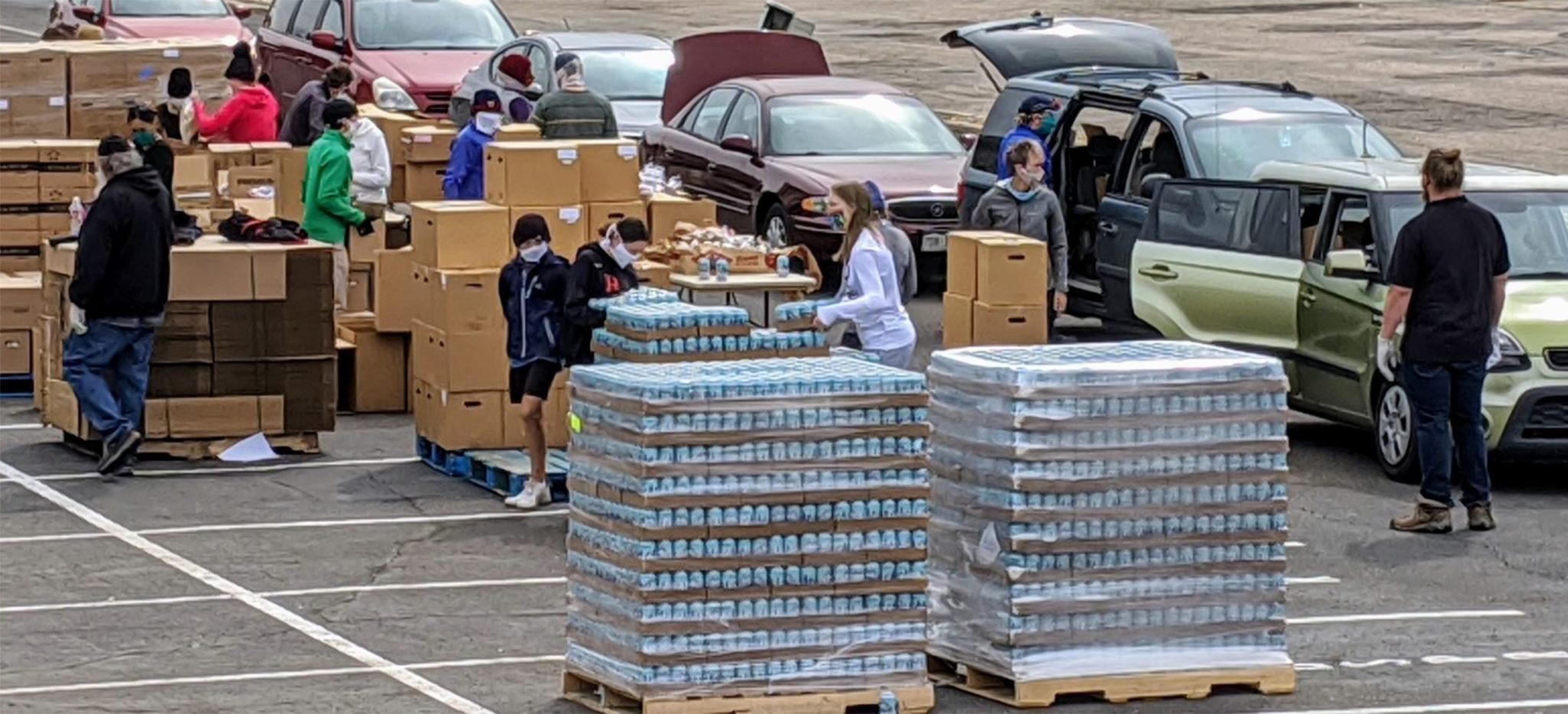
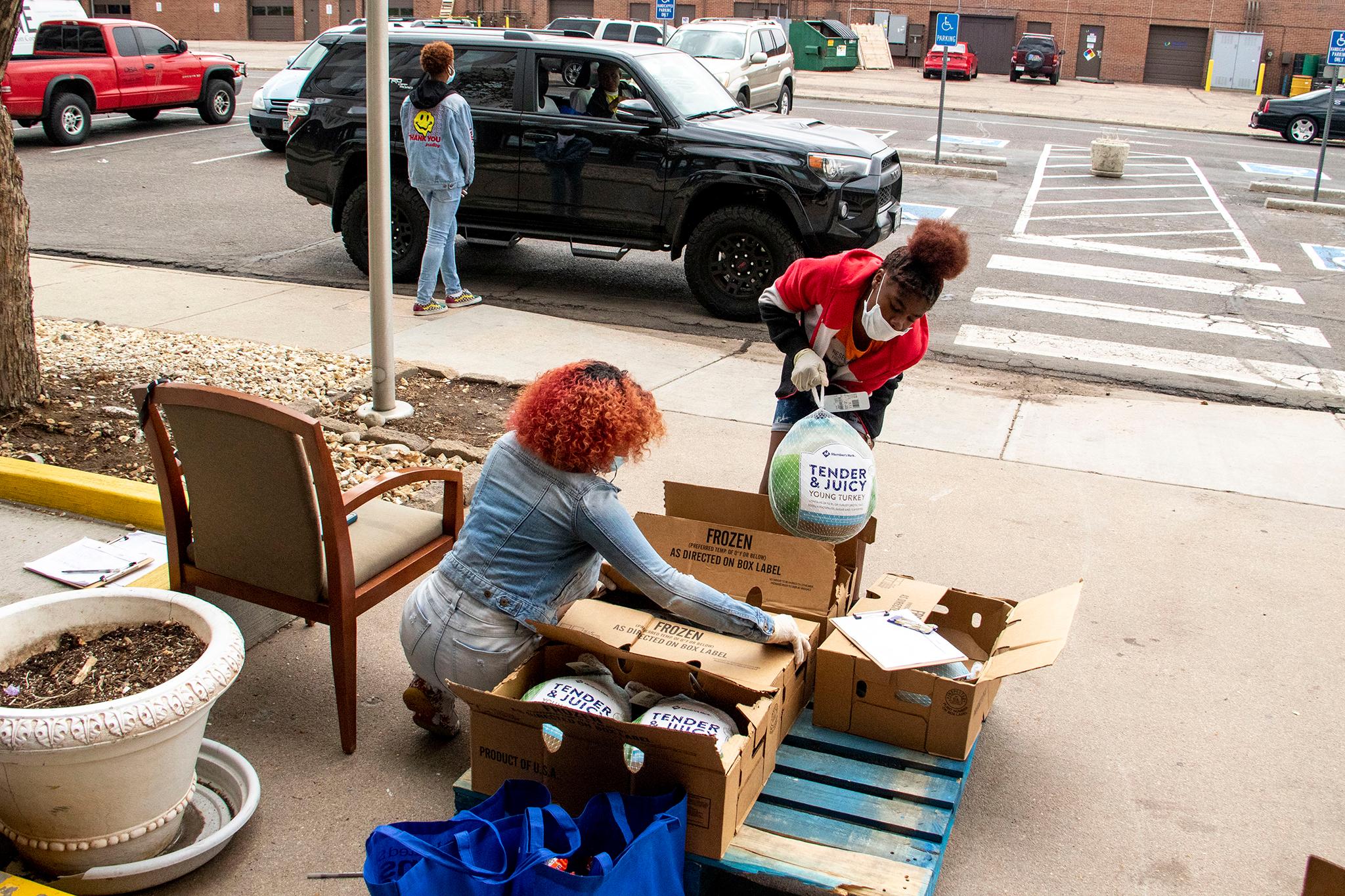
The Commodity Supplemental Food Program is just part of what the bank does. The organization supports people of all ages in much of Colorado and all of Wyoming. In March, Food Bank of the Rockies and its partners distributed food to about twice as many people as in normal times, and some hard-hit communities reported up to five times the usual number of clients, spokeswoman Janie Gianotsos said.
Erin Pulling, president and CEO of the food bank, said families who depend on her organization are often a car maintenance bill or health emergency away from financial disaster. Since the coronavirus outbreak, health care providers have turned to the food bank for, for example, help ensuring patients leaving the hospital had food at home.
The pandemic "is exacerbating the vulnerabilities that our communities have," Pulling said. "We've had to increase so quickly."
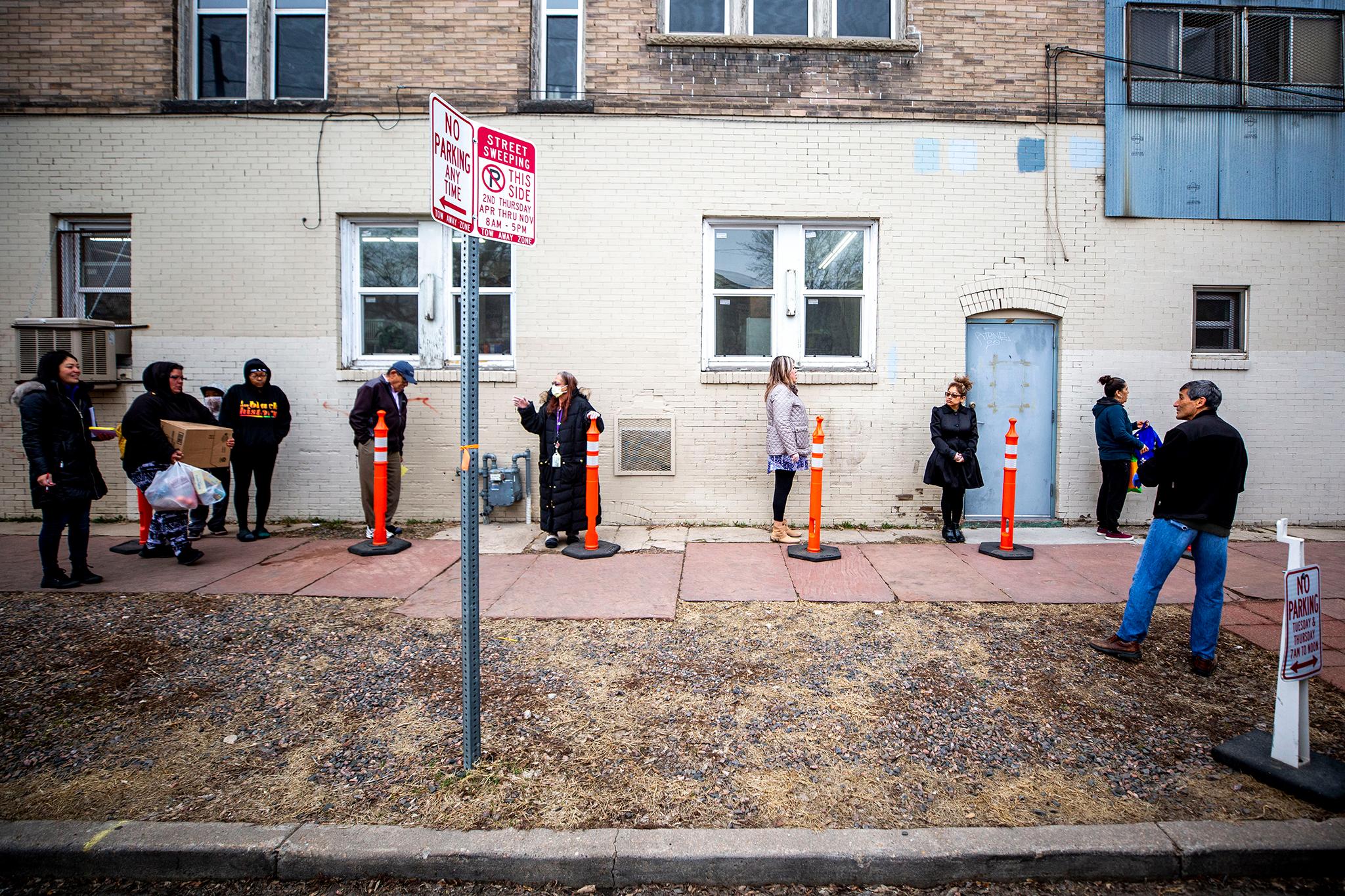
Even as needs were exploding, food donations were decreasing, Pulling said. Grocery stores and other retailers had supplied a third of what her organization distributes, handing over food that was edible but passed over by shoppers. Amid the coronavirus, shoppers were instead emptying shelves, and Pulling's donations dropped by 20 percent. Work forces at meat-packers such as Smithfield and JBS, which had been been key food bank suppliers, were hit by COVID-19 outbreaks.
The Food Bank of the Rockies has had to buy more of its food, in some cases competing with other food banks, pushing up prices. Pulling said her organization typically spends $200,000 a month to buy food. In March, it spent $600,000. Cleaning supplies and masks also have added to Pulling's costs. The Food Bank of the Rockies has been seeking more cash donations.
"Our budget is out the window," Pulling said.
While her organization does distribute some food directly to seniors and other individuals, it for the most part relies on pantries.
Since the pandemic, some pantries shut down because they were based at schools and churches, places that closed because of public health orders aimed at reducing occasions for people to gather and the coronavirus to spread. Other pantries closed because they lost their volunteers. Volunteers often are older, and older people are at higher risk of the worst consequences of COVID-19.
The Food Bank of the Rockies lost its own army of volunteers almost overnight. When stay-at-home orders were issued, the corporations that had paid employees to volunteer at the food bank told their workers to stay away from group settings such as the Food Bank of the Rockies warehouse in Montbello. Pulling also sent home food bank employees who were in vulnerable groups. Her volunteer force recovered thanks in part to young people who came from Boys & Girls Clubs in Denver, and she hired additional staff. The food bank has gone from supporting about 700 pantries in the region to about 200 that were able to step up their operations.
Amy Eurek, who manages the pantry at Catholic Charities's Little Flower Assistance Center in Aurora, said working with the food bank has allowed her to meet growing needs. More than 200 new families in Aurora and east Denver came to her pantry this March, compared to 56 families who signed up for the first time in March of 2019.
"It's the new folks that's the startling number," Eurek said. "Folks we normally don't see at the food pantry were coming to us."
Eurek is also redistributing deliveries from the food bank to other Catholic Charities programs, partially to ensure families and seniors in affordable housing complexes are served and that children in preschools that have closed get boxed breakfasts, lunches and snacks.
"We want to get people fed," Eurek said.
Her pantry and others across metro Denver have changed routines to allow for the social distancing needed to contain COVID-19. Instead of people coming inside to choose food for themselves, volunteers prepare boxes and bags ahead of time that recipients pick up outside.
Eurek also oversees Catholic Charities programs to help people with utility bills. In the past, people had to come to Little Flower for interviews as part of the application process. When stay-at-home orders were issued, she switched to accepting documents by email and conducting interviews by phone.
"That's been working so well," Eurek said, adding that it may continue the new system when the coronavirus crisis has ended.
"Sometimes these crisis times can create ... innovations," she said.
It's not just food banks and pantries that feed the hungry.
After Denver Public Schools closed March 18 because of the coronavirus, Theresa Hafner, director of the district's nutrition services, led an effort to continue feeding students. On a normal day, she said, district kitchens serve 45,000 lunches, 35,000 of those to children who pay nothing or a reduced fee as part of a federally funded program for low-income families.
The district distributed grab-and-go meals initially at 12 schools chosen because they had a high percentage of kids on the free and reduced meal program. But only 7,000 students were taking advantage of the meals.
"Where are the rest of the kids?" Hafner recalled thinking.
She turned to district data experts who took a closer look at where families in need were living. It turned out to be all over the city, not just near the schools with high free and reduced numbers, a revelation for Hafner.
More grab-and-go sites were added and buses started ferrying meals to some apartment complexes. Still, the district has been able to reach no more than 13,000 children. Hafner said she was working with partners such as the Denver Housing Authority to try to get the word out and could open more sites.
In-school learning and in-school lunches won't resume before fall at the earliest. The grab-and-go program at schools and on wheels will continue through the summer, Hafner said.
"We feel that they are still our kids during the summer," she said. "We feel that they're still our kids during emergencies."
And not just the kids. Meals also are being offered to adults in families that are struggling, with the Denver Public Schools Foundation, a nonprofit that supports the district, contributing funds to cover the extra cost. Another nonprofit partner, Food for Thought, is at the grab-and-go sites every Friday to hand out bags containing enough food to prepare meals for a family of four for two days. Food for Thought is feeding families whether they have children in DPS schools.
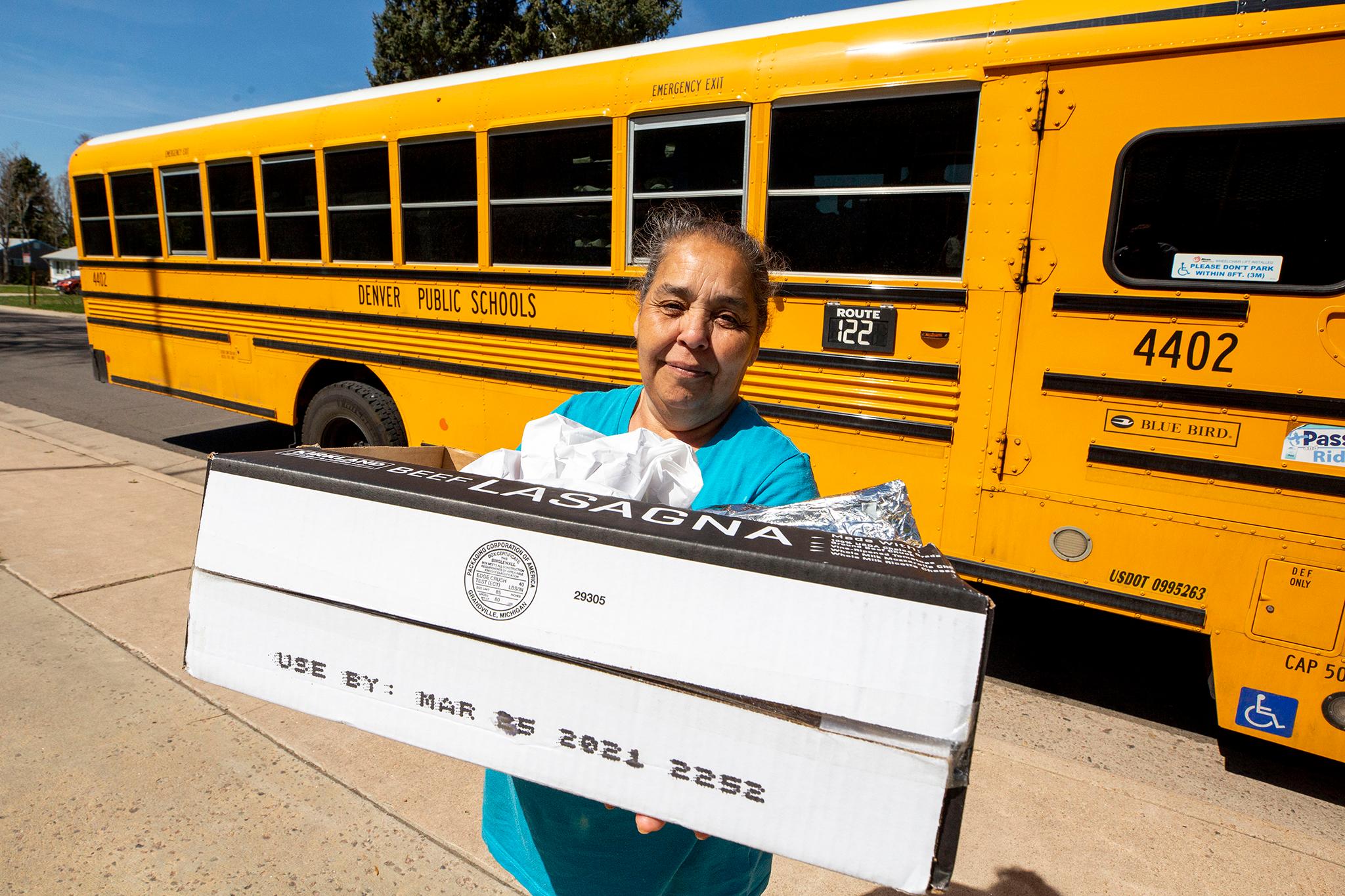
Liz Dikeman has not been taking advantage of the coronavirus meals program in Adams County, where her 10-year-old daughter attends school. Instead, the Dikemans have been picking up meat, produce, milk and vegetables from a pantry the food recovery nonprofit We Don't Waste, set up in partnership with Focus Points Family Resource Center in Elyria-Swansea.
Before the pandemic, Dikeman had started work on her high school equivalency certificate at Focus Points, which offers early childhood and adult education, job training and other support for families. Her mother has used Focus Point's job placement services.
"They've helped my mom and me get back on track with life," Dikeman said. "I'm going to work there one day. That's my goal."
Focus Points and We Don't Waste had connected last year. Before that, We Don't Waste had for a decade concentrated on collecting food that restaurants, caterers, hotels, wholesalers had been unable to sell and delivering it to partners like the Colorado Coalition for the Homeless and Volunteers of America for distributing to consumers. With Focus Points, We Don't Waste set up its own mobile pantry every other week outside Focus Points in Elyria-Swansea, which has no large grocery store and where corner shops don't stock much fresh produce.
Following the coronavirus outbreak, We Don't Waste moved into a church parking lot next door to Focus Points to enable it to serve more people and observe social distancing. Instead of walking up, people drive through to have their cars loaded with food. Police cadets help serve hundreds of cars, some of which are collecting groceries for more than one family.
"It was well-organized, for sure," Dikeman said. "It was huge and organized."
Having a well-stocked refrigerator and freezer and knowing We Don't Waste will be back has eased some of her stress.
The solar company for whom she works as a telemarketer cut back her hours as sales dropped following the coronavirus. She went from 40 hours a week to 20 or less.
"It's been hit or miss," she said of her hours and commissions. She might have to look for another job.
She's been able to work from home since the pandemic hit. Dikeman can keep an eye on her fifth-grader's remote learning. She said she feels fortunate to have already been connected with Five Points. For people who don't know where to turn when a crisis hits, "it's probably really sad and terrible," she said.
"I don't know what I would do if I didn't have the resources," she said. "I've learned to ask for help when needed."
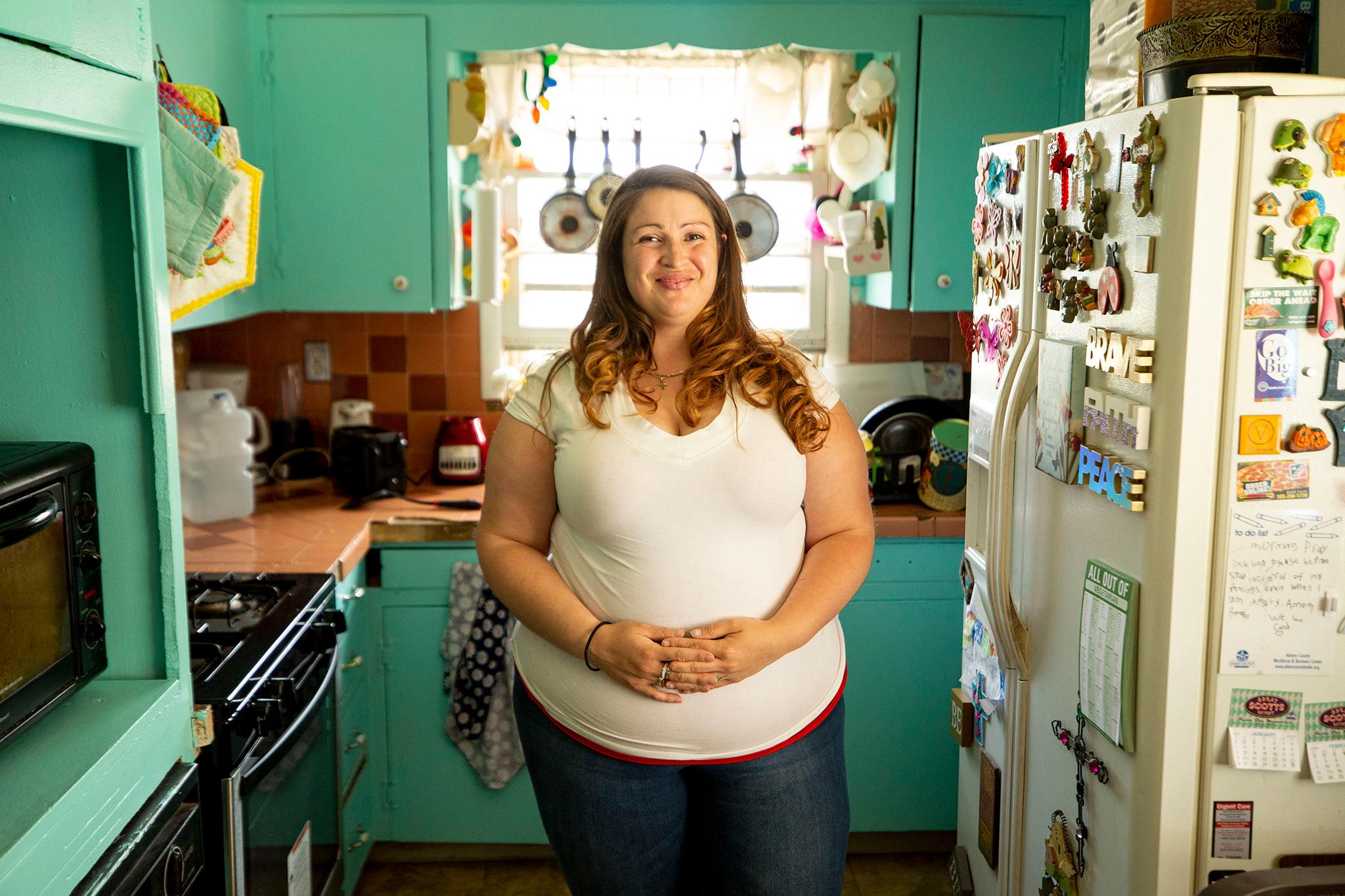
Following the arrival of the coronavirus, Focus Points has taken on more partners, including GrowHaus, an Elyria-Swansea food nonprofit. Since March, Focus Points has signed up more than 400 families representing 2,000 people to receive GrowHaus food packages.
Focus Points also is a founding partner of the Denver Metro Emergency Food Network.
Since mid-March the network has delivered more than 140,000 free meals to people in Denver and within 15 miles of the city. The other founders are Bondadosa, a food delivery social enterprise; Denver Food Rescue, a nonprofit that collects food that would otherwise be discarded by grocery stores, farmers markets, and produce distributors to stock pantries; Friends & Family, a nonprofit that supports people in Colorado's food and beverage industry; and the restaurant Lost City.
The network has received support from such organizations as Healthy Food for Denver's Kids, which was created last November when voters approved increasing the sales tax by .08 percent -- less than a penny for every $10 spent -- to raise an estimated $11 million a year over a decade to be used to feed kids and educate them about nutrition. Following the coronavirus outbreak, Healthy Food for Denver's Kids Commission approved more than $1 million in spending to help pantries and food initiatives such as the Denver Metro Emergency Food Network.
While the other network partners bring expertise in making and delivering food, Focus Points's strength is its connections with people such as Dikeman. In the early days of the network, Focus Points called the 1,500 people it works with to see how the pandemic was affecting their needs. Those that mentioned food were directed to the Denver Metro Emergency Food Network. Focus Points also took calls from outside its service area on behalf of the network, increasing its help desk staff from four to six to handle the load. Once the network got a website up and running, the calls to Focus Points decreased.
For now, Focus Points's workforce development programs have taken a back seat to its work meeting food and other basic needs.
"We were an organization that before this happened we didn't consider ourselves doing food access," Focus Points Executive Director Jules Kelty said. "When COVID hit, it was such a big need. We consider ourselves in the food access, food security realm now."
She's also seen the need to strengthen connections to the internet in impoverished communities. Closing the digital divide was a Focus Points concern before, but the pandemic made clear that lack of access to computers and lack of computer literacy can mean that people lose out on critical information during crises.
Looking beyond the pandemic, Kelty worries that minority communities that have been hard hit will be overlooked when economic recovery plans are made. Connections she's making now with businesses involved in the Denver Metro Emergency Food Network could help her secure jobs and job training for Focus Points clients, she said..
Arlan Preblud is founder and executive director of We Don't Waste, the nonprofit that has brought food to Focus Point clients. His model has depended on restaurants having more food than they needed.
Now many restaurants are closed and some may never reopen. Those that do may try to operate more efficiently. Preblud has been writing grants to raise money to buy food, something We Don't Waste has not done before, to provide for the working poor, which has been hard hit by the economic downturn created by the coronavirus.
Preblud's days have been busy organizing the logistics of ever-growing food distributions and answering emails from people looking for food and people who want to help. He's taken time in the evenings to watch "The Roosevelts," a Ken Burns documentary on Theodore Roosevelt and Franklin and Eleanor Roosevelt.
The documentary's description of Franklin Roosevelt's New Deal programs such as social security and their evolution from being seen as radical to integral have resonated with Preblud during the coronavirus crisis. He's left wondering what proposals that now seem radical could emerge as policy.
"There has to be more of an equitable treatment of people," he said. "We have to give people their boots."
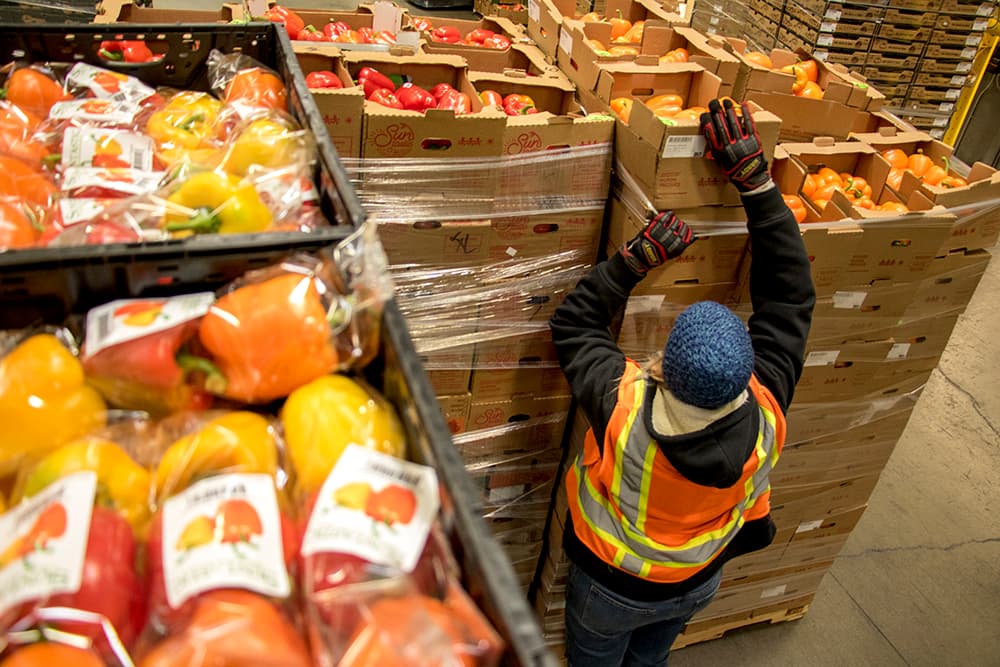
Teva Sienicki, CEO of the Denver anti-hunger organization Metro Caring, began working in food security during the economic downturns of the early 2000s. Nothing compares to what's happening now: "I've not seen need spike so quickly ever before."
Metro Caring can address immediate needs at its City Park West pantry. Sienicki said she also has had people coming to her wanting to help and to talk about broader questions.
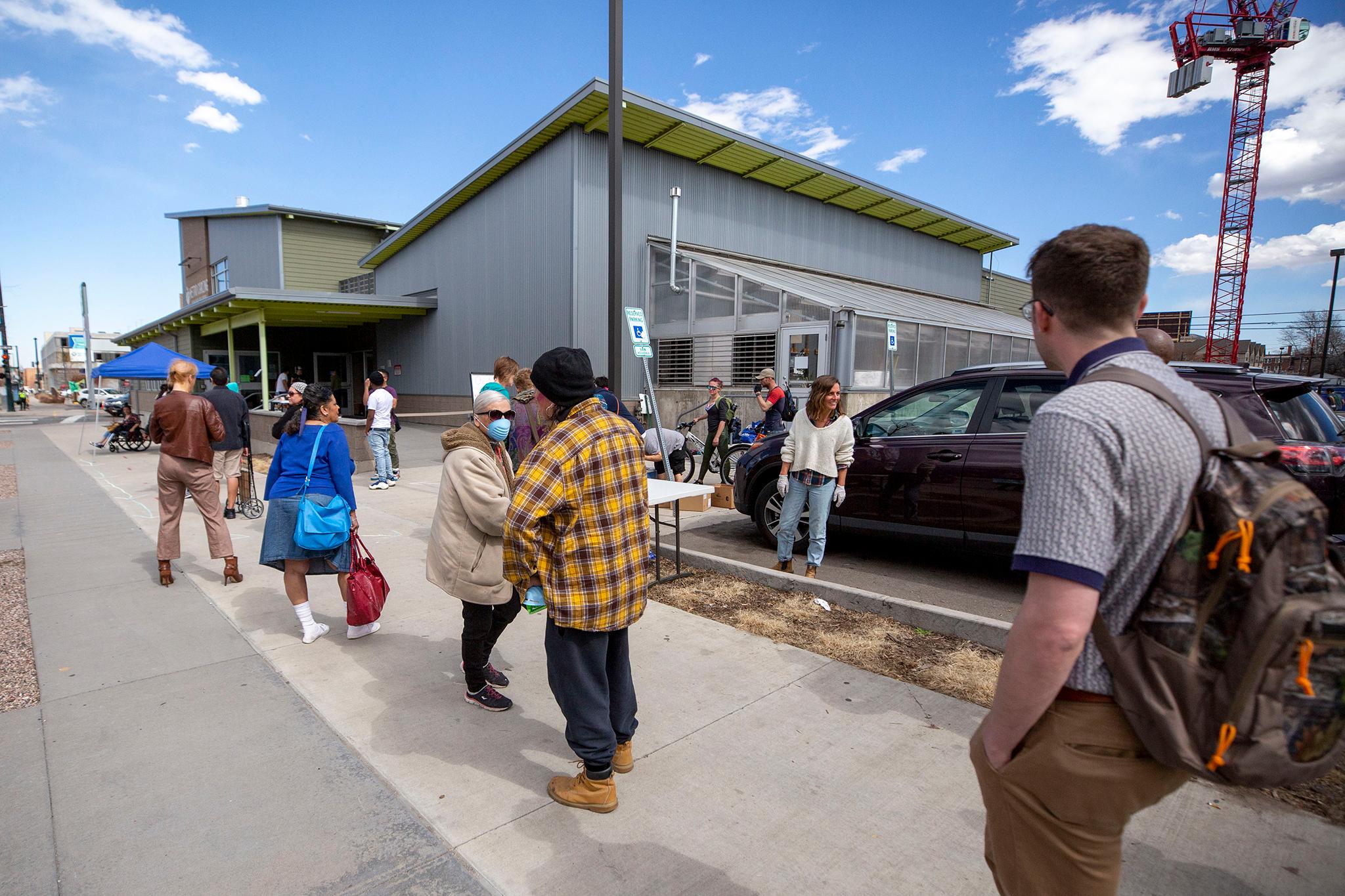
"All of the trends in our economy now for a couple of decades have led to growing inequality," she said, pointing to wage stagnation and increases in the cost of living.
Sienicki said now is not the time to discuss specific fixes, whether it's a universal basic income or revising the rules for SNAP and other aid programs. Instead, she urged people to spend time talking to those who are struggling to better understand their needs.
"Empathy is the beginning," Sienicki said. "If we can feel empathy for one another, that is the beginning of us going forward thinking about how we want to go about building our community in a better way."
Pulling, of the Food Bank of the Rockies, has seen the haves thinking of the have-nots in the form of a spate of donations for $1,200. That's the amount many Americans are seeing on checks they're getting under the federal Coronavirus Aid, Relief, and Economic Security, or CARES act.
Riley Harwood did not send his entire $1,200.
He did pass some of the money along to the Food Bank of the Rockies, saying that as a recent arrival in the Denver area, he wanted to do something to help his new community.
Harwood, who moved to Denver last year, works for a solar company that focuses on engineering and quality assurance for the construction of large utility projects. His own income and ability to buy food has not been affected by the coronavirus, but he has faced financial challenges in the past and knows others are struggling now.
"There's just so many people in the United States who are just paycheck to paycheck," he said.
He said the coronavirus crisis has sparked an interest in finding answers to economic questions. He has not yet settled on answers, he said.
"The main thing that I need to do to start is just get more informed."

